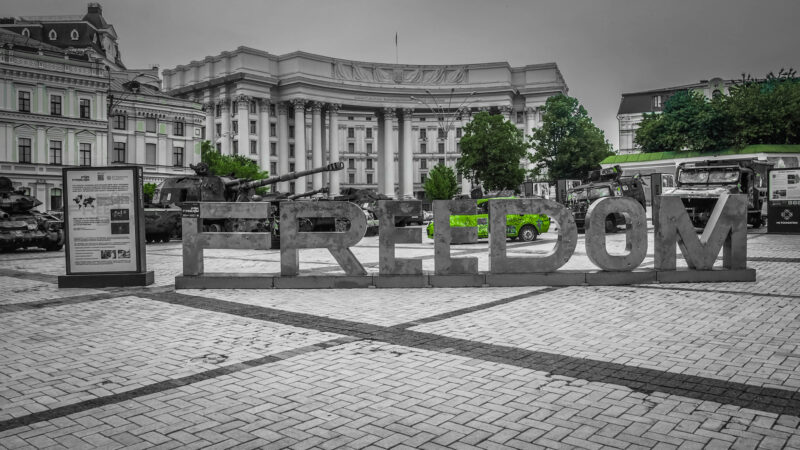Interview with Volodymyr Shelukhin | Social sciences are useful for consolidating democracy and overcoming the legacy of totalitarianism

Roman Petryshyn: This year you organized the first-ever conference held in Ukraine that was dedicated to the history of Ukrainian sociology. Let’s start by identifying how rare this theme is among Ukrainian scholars.
Volodymyr Shelukhin: Yes, it may sound strange that a conference on this topic took place for the first time in June 2024. Why did sociologists not organize such a conference ten years ago or even earlier? The answer is that the history of sociology is not a popular topic, and not just in Ukraine. Usually we don’t even have specific sessions dedicated to the history of sociology during regular conferences.
This year we had a good incentive, with two anniversaries coinciding: 190 years of Kyiv University, where sociology was first taught in Ukraine, and the centenary of the Ukrainian Sociological Institute in Prague (USI). Moreover, the history of sociology in Ukraine has been affected by both the closed character of the Soviet period and today’s openness in independent Ukraine.
This event was needed. Sociology, like other social sciences and humanities, depends on its history much more than fields like chemistry, physics, or even economics. A physicist doesn’t need to quote Newton, but in sociological journals we find a lot of references to Durkheim and Weber, for example.
Petryshyn: The academic tradition of sociology in Ukraine is relatively stable: Durkheim, Weber, and Marx. How do you explain to foreign colleagues why Ukraine needs a history of sociology?
Shelukhin: Studies in the history of sociology can offer new insights for theoretical thinking. A good example is Serhii Podolynsky, a Ukrainian sociologist of the second half of the 19th century, whose ecological turn in social theory is inspiring.
Natalia Chernysh, a professor at the Lviv Franko National University, noted that the founders of sociology were usually not interested in national identity. Early Ukrainian sociology was developed by Ukrainian authors whose concepts were in advance of their time. For example, everyone knows Miroslav Hroch’s three-phase conception of nationhood from the 1980s. His theory is classical. However, Olgerd Boczkowski (Bochkovskyi) developed the same concept during WW I. He published some of his texts in Czech and German as well as in Ukrainian. It’s possible that Hroch relied on Boczkowski’s work, but it should be verified.
Early Ukrainian sociology also contributed to the aforementioned “stable” tradition. Rarely known, for example, is that Mykhailo Drahomanov influenced Weber in his view on national issues and democracy! Such cases mean that studies in the history of Ukrainian sociology could contribute to the study of classical sociological tradition.
I explored a variety of topics in the archive of the émigré Ukrainian Institute of Sociology (Ukrainskyi instytut hromadoznavstva) in Prague, which was closed for almost half a century during the Soviet regime’s dominance in the region. Many early Ukrainian sociologists were former politicians. The founder of the institute, Mykyta Shapoval, was a leading member of the Ukrainian Party of Socialist Revolutionaries. When the Ukrainian National Republic was defeated, many of them were forced into exile and searched for answers for two questions: why did Ukraine lose its statehood and what should be done for liberation?
Vsevolod Petriv developed the field of “military sociology” in the 1920s. The “classical” Western beginning of the field in the 1940s was with the “American Soldier.” If we are to borrow from previous experience, we must be able to study it.
Shapoval’s “sociology of liberation” could be integrated into postcolonial theory. He was one of the first who started to analyze Russian-Ukrainian relations in colonial terms, with a strong structural focus.
It is well known that early national traditions of sociology in Western Europe developed somewhat in isolation. Weber did not quote Durkheim and vice versa. Ukrainian authors quoted both of them and demonstrated greater openness than the French and German founders. I believe we may effectively contribute to contemporary theoretical discussions if we study this subject more precisely. However, we cannot do it in isolation.
Petryshyn: Therefore, the colonial dimension is relevant…
Shelukhin: As well as the totalitarian one. The conference included a round table during which relations between the totalitarian regime and Soviet sociology were discussed. A leading contemporary sociologist in Ukraine stated that many Ukrainian sociologists tended to be critical during the Soviet era. The topic is controversial. Sociology was re-established during the late Soviet era, in hopes of finding solutions to the crises facing the regime. In Ukraine, sociology today serves as an important tool for democratic consensus, while in Russia sociologists generally serve the regime, with just a few exceptions. The history of sociology in Ukraine can provide a better understanding of the potential usefulness of social sciences for consolidating democracy and combating the lasting effects of totalitarianism. This topic should become a priority, especially in light of the rise today of autocracies worldwide.
Petryshyn: Has this topic been studied in Ukraine?
Shelukhin: As a first step, I wrote a working paper on it two years ago. It was during the first year of Russia’s full-scale invasion of Ukraine, and I missed the journal’s deadline. It is still a working paper, but I hope I will find an opportunity to return to it, and I know a colleague who shares the same interest.
Petryshyn: Who are the authors that first developed the field of sociology in Ukraine?
Shelukhin: The list is relatively long, but here are a few key names. The intellectual beginnings of sociology started with Mykhailo Drahomanov (1841–95). He was an original thinker who combined Western influence with ideas that had emerged in Ukraine (Mykola Kostomarov’s narodnytstvo [populism] prepared the ground for the development of sociology in Ukraine). Initially a positivist, he developed his ideas far beyond one-dimensional positivism.
The academic and disciplinary foundations of sociology were laid by Mykhailo Hrushevsky (1866–1934) and, more so, by Mykyta Shapoval (1882–1932). Many authors before them wrote on sociological topics, but Hrushevsky and Shapoval made significant contributions in an organizational way—by establishing institutions, journals, teaching courses etc. Oksana Yurkova, has documented Hrushevsky’s activity in the All-Ukrainian Academy of Sciences (VUAN) in the 1920s.
Petryshyn: A round-table discussion about Ukrainian sociological traditions was held online in Kyiv on 5 June 2024 with the participation of Viktor Stepanenko, Volodymyr Paniotto, Liudmyla Males, and Olha Kutsenko. Please summarize some of their important comments.
Shelukhin: First, we discussed the boundaries of Ukrainian sociology and agreed that it includes not only those who worked directly in Ukraine but also those who, due to migration or other circumstances, ended up outside its borders and dealt with the study of Ukrainian issues, theory, or society. We also discussed the similarities and differences in the history of Ukrainian sociology compared to other national and regional traditions. Reasons for studying Ukrainian sociology in particular were discussed. Currently, it’s a relatively small part in the general history of sociology syllabus.
Valuable insights were mentioned, such as how the history of Ukrainian sociology better allows for understanding the colonial dimension in the history of social sciences. Prof. Males emphasized the importance of including the work of Maksym Kovalevsky in the history of Ukrainian sociology, particularly with his report on the role of scientists in Russian colonial policy in the Caucasus and Siberia in the 19th century. In her speech, Prof. Males also drew attention to the role of women in establishing sociological centers in various cities of Ukraine after World War II. She particularly mentioned Natalia Chernysh, Olena Yakuba, Iryna Popova, Lidiia Sokhan, and Natalia Panina. Males hypothesized that due to gender factors, women were often pushed into less privileged and ideologically less “dangerous” disciplines like sociology. So, the history of Ukrainian sociology can also provide a better understanding of gender inequality in knowledge production and distribution. This could be valuable for contemporary studies in the sociology of knowledge and science.
Petryshyn: How have the founders of Ukrainian sociology been re-assessed in light of this renewed examination of the field?
Shelukhin: The re-examination of the founders’ legacies is a task for the future. We should start with the viewpoint that sociology in Ukraine was not just an adaptation of Western ideas of the 19th and early 20th centuries; it also had its own profound local intellectual roots. Today, a typical Ukrainian sociologist is not aware of these roots, due to the significant hiatus in the history of Ukrainian sociology imposed by Stalin’s rule. As Volodymyr Paniotto mentioned during the round table, the period of early Ukrainian sociology in the 19th and early 20th centuries was completely excluded during Soviet times, for political reasons. Several generations of Ukrainian sociologists were shaped without this knowledge.
The history of Ukrainian sociology has often been written in terms of “influences.” We took a Western author and looked for a local follower. Comte influenced X and Spencer influenced Y. That approach does not constitute a history of Ukrainian sociology, nor does it capture the true development of the discipline. Sociology is a part of the broader culture, and, in some sense, we need to write the early history of Ukrainian (and not only Ukrainian) sociology in context, as part of Ukraine’s general culture-history. We will be able to productively re-examine the founders’ legacy only after taking this step.
Petryshyn: What next steps do you expect will be undertaken? What issues are blocking movement in this direction?
Shelukhin: Despite the gathering of researchers from different fields, the conference demonstrated that our community is not large. We are hampered in attracting new members due to the scarcity of resources. For example, my colleagues from the faculty had to take power charging stations from home to avoid electricity troubles caused by Russian attacks. I also spend my own money for organization. This is our reality. Many sociologists choose gender issues, migration, or other topics that sound more reasonable for the moment and clearer to donors.
Many donors fail to understand that donations for research and humanitarian topics are not the same. If you truly want to support the scholarly community, you need to support ongoing fundamental research as well. For example, my experience with archival research motivated me to study the interdependence between early Ukrainian sociology and Modernism in the arts. In April, together with pianist Pavlo Lysyi I organized an “acoustic seminar”—an experimental format combining lecture and concert—dedicated to this topic. Modernism was an important source of inspiration for sociology and vice versa. The well-known Bergsonian intuitivist influence on Alfred Shutz leads to the same question: What was the association between early sociology and Modernism? The answer could change our epistemological way of looking at the essence of sociology. If asked “How does it contribute to rebuilding Ukraine?” my response is that it does contribute, but in unexpected ways that you would not recognize. Donors focus on applied problems, and we as scholars are challenged to explain the importance of our work to them. Since the Soviet era, Ukrainian sociologists have avoided “big” theoretical questions. It’s a part of our professional habitus that has caught up with us and is currently slowing us down.
One possible solution is through interdisciplinary collaboration. This topic provides a good foundation. For example, the Russian invaders are doing the same thing in the occupied territories as they do in museums: they are destroying and expropriating Ukrainian heritage. In my opening essay at the conference, I mentioned the case of Mykola Ziber. We need to make the remarkable texts of early Ukrainian sociologists public and accessible to a global audience.
It will be epistemologically ineffective if we explain Ukrainian studies in terms of philology, journalism, and general history. Analogously, we cannot simply translate fiction and current nonfiction into English and think that translations of war-oriented nonfiction will fully represent the Ukrainian voice in the world. For example, translating Podolynsky to represent Ukraine and its pains for decades after this war will unfortunately not work and will be forgotten. It is not enough to represent the tragedy of the war, it is also essential to integrate Ukrainian heritage into established and enduring intellectual traditions recognized worldwide. This is a completely different challenge.
We need to integrate studies of the history of Ukrainian sociology and social thought into global discussions and create a relatively stable network of researchers from different fields on this issue. I believe the conference was a good beginning and may start to effectively contribute to contemporary theoretical discussions.




